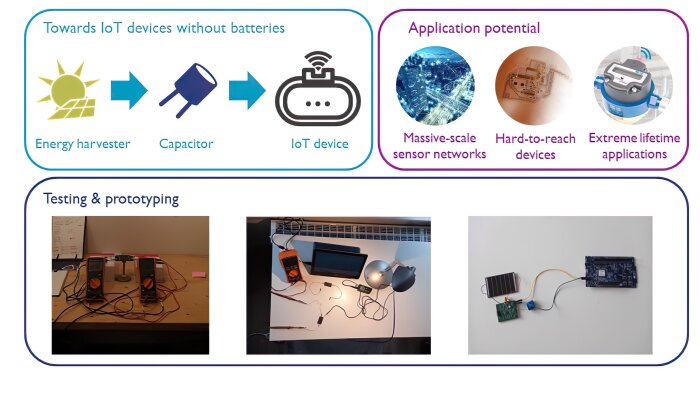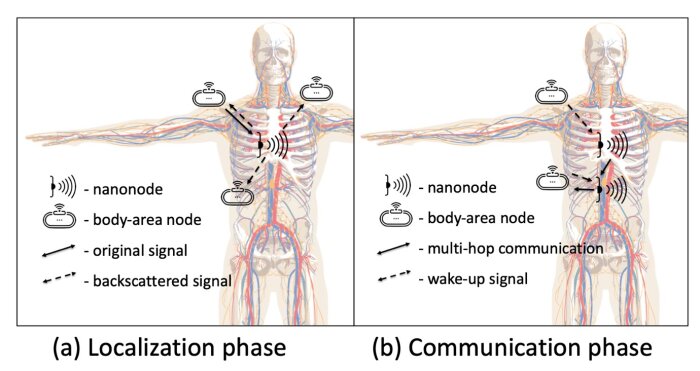The Internet of Things (IoT) vision has enabled the wireless connection of billions of battery-powered devices to the Internet. However, batteries last at best a few years. Replacing and disposing of billions of dead batteries every year is costly and unsustainable. To address this issue, we research novel sustainable IoT devices powered by renewable energy harvesting. This allows such devices to recharge their batteries in the field, or even run without batteries, extending their maintenance-free lifetime to many years.
Traditional computing, communications, and networking paradigms are ill-suited to handle the variable availability of energy, which may cause devices to turn on and off unexpectedly. In this research track, we build energy-aware embedded computing platforms to enable IoT applications to run on energy harvesting devices, optimize low-power wireless networks to operate with tiny amounts of harvested energy, and investigate novel forms of hybrid energy harvesting and wireless power transfer.
Research examples
- Energy-aware IoT devices: An important step achieving stable operations on energy harvesting IoT devices is making the devices aware of their energy needs and supply. In this research line we investigate how to enable energy-awareness through the design of resource-efficient machine learning algorithms for predicting the energy harvesting power for different sources (e.g., light, vibration, radio waves) over time. Moreover, we develop models that characterize the average and worst-case energy consumption of the device’s hard- and software components. These models are based in (i) lab-based device profiles and measurements, (ii) stochastic mathematics, (iii) online machine learning. Subsequently, we optimize the operations of application tasks running on the device by adapting their execution to the available and predicted energy
- Energy-efficient communication: The second research line investigates energy efficient communications and networking paradigms that can operate in face of very limited and variable energy availability. We develop and optimize network protocols for a variety of network technologies, including LoRa(WAN) and Bluetooth Low Energy to successfully operate on energy harvesting IoT devices. Various techniques are employed, such as (i) energy-aware duty cycle reduction, (ii) use of low-power wake-up radios, and (iii) protocols optimized for simultaneous wireless information and power transfer (SWIPT).
- In-body communication: Ingested or implanted devices are a highly relevant candidate for making use of energy harvesting and battery-less technology, as replacing batteries in such devices would require invasive procedures. In this third research track, we develop self-sustaining and safe connected sensors for in-body use. We study various types of energy harvesting, and communication techniques optimized for safe and efficient operations inside the human body. Moreover, we investigate network protocols for nanoscale transceivers for communication with and between groups of nanodevices flowing through the bloodstream. Such devices are envisioned to enable targeted drug delivery and disease diagnosis at unprecedented scales.
-
 Ultimately, we can get rid of the batteries in IoT devices by replacing them by an energy harvester combined with a capacitor, which has a lot of potential in massive-scale, hard-to-reach and extreme lifetime applications. We are prototyping energy-harvested (e.g., solar-powered) IoT devices to test the amount of energy that can be harvested.
Ultimately, we can get rid of the batteries in IoT devices by replacing them by an energy harvester combined with a capacitor, which has a lot of potential in massive-scale, hard-to-reach and extreme lifetime applications. We are prototyping energy-harvested (e.g., solar-powered) IoT devices to test the amount of energy that can be harvested. -
 In-body nanonodes flowing through the bloodstream, combining accurate localization and in-body communication, have the potential for diagnosis and drug delivery at unprecedented accuracy.
In-body nanonodes flowing through the bloodstream, combining accurate localization and in-body communication, have the potential for diagnosis and drug delivery at unprecedented accuracy.

